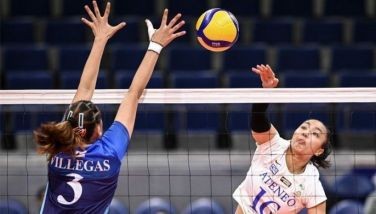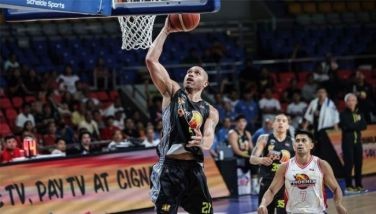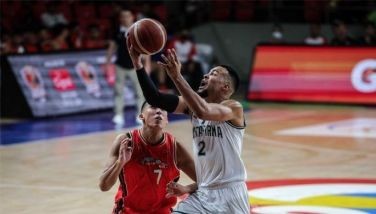Reunion in Changsha

Two former Chinese national basketball stars who played in the Asian Youth tournament here in 1982 got together by accident during the recent 28th FIBA Asia Championships in Changsha.
Wang Fei, 52, and Wang Libin, 52, hadn’t seen each other in years. So the reunion in Changsha was a wonderful surprise because it wasn’t planned. Wang Fei served as a TV commentator for the China games while Wang Libin, now a university varsity coach, was a spectator in the stands. They crossed paths in a corridor at halftime of the China-Qatar game in the second round of eliminations last Sept. 29 and embraced when their eyes met. I was there when it happened and took pictures to immortalize the moment.
The two Wangs were in Manila to play for China at the Asian Youth Championships in 1982. Both remembered the event like it happened only the other day. Wang Fei said he’ll never forget the Philippines’ brilliant coach Ron Jacobs and Wang Libin said he’ll never forget the Philippines’ cerebral point guard Hector Calma.
The late sportswriter Vic Villafranca said there were 35,000 fans who packed the Araneta Coliseum to witness the historic gold medal match between the Philippines and China that year. Ambassador Danding Cojuangco was the man behind the Philippine team as the country’s basketball godfather. The crowd at the Big Dome included the First Lady Imelda Marcos and her son, now Sen. Bongbong Marcos.
Villafranca said the Philippine squad trained five months for the tournament and described the 74-63 win over China in the final as a “hardcourt miracle.” China had ruled the Asian Youth tournament for eight years and didn’t seem ready to be dethroned until Jacobs came along.
* * * *
“It was a euphoric moment for Philippine basketball which hasn’t seen anything quite like it since 1974 when the country won the ABC crown against South Korea in another place of battle, the old hoophouse along Vito Cruz in Manila,” wrote Villafranca in Sports Weekly Magazine. “But that was another time, another era. So much has happened – most of them disastrous – to local basketball since (and) the country needed a spark to get it out of the darkness and the doldrums it was in.
Villafranca said before the final, Jacobs said, “We can beat China if we do things correctly.” Villafranca added, “In short, nothing less than a perfect game would enable the Philippines to overcome China’s built-in advantage in height and heft and its superior firepower. In a nutshell, perfection was the name of the game that the local boys played a great part of the way and all heart was what they displayed against the taller, much tougher Chinese in pulling off what earlier had seemed like a mission impossible. As to how the hometown team managed to stifle the big guns of the Chinese team, a fact which was underscored by the way the Filipinos held the Chinese to just 31 points in the first half, their lowest output in the series, Jacobs said he figured ‘if we would keep them out of the undergoal area, we had a chance.’”
It was a similar strategy that Gilas coach Tab Baldwin employed against China in Changsha last Saturday. Gilas took away China’s inside strength with a stifling zone and the Philippines even had more points in the paint, 30-26. China’s three bigs – 7-2 Yi Jianlian, 7-1 Zhou Qi and 7-0 Wang Zhelin – were a combined 4-of-24 from the field and the team as a whole was held to 38 percent field goal shooting, its lowest in any game in the tournament. But China compensated by scoring nine more points from beyond the arc and six more points from the line. The 15 incremental points provided the cushion for China’s 78-67 win.
* * * *
In 1982, Wang Libin hit 19 points and Wang Fei 11 in China’s loss to the Philippines. The Philippines was led by Alfie Almario with 20 points. Other scorers were Calma 11, Teddy Alfarero 10, Jun Tan 9, Jong Uichico 8, Elmer Reyes 7, Leo Austria 5 and Richard Mendoza 4. Derick Pumaren, Louie Brill, Tonichi Yturri and Rey Cuenco completed the Philippine cast. The Philippines clinched the title with more free throws made, 24-of-31 to China’s 11-of-19 and less turnovers, 12-23.
Uichico was also in Changsha as an assistant coach in Baldwin’s staff with the Philippine team. Wang Fei and Wang Libin were told that Uichico was in town but didn’t get the chance to greet him.
Wang Fei and Wang Libin were also teammates at the 1988 Olympics and 1986 FIBA World Cup. Wang Fei also played with Chinese hoop legends Ma Jian, Gong Luming (now the Chinese national coach), Shan Tao and Gong Xiaobin at the 1990 FIBA World Cup. Wang Libin saw action at the FIBA World Cup in 1982 and 1986 and the Olympics in 1984 and 1988.
Wang Fei averaged 10 points in 7 games at the 1988 Olympics and scored 21 points in China’s 106-74 loss to Spain. He was the Chinese national coach at the 2002 FIBA World Cup in Indianapolis where the mainstays included Yao Ming, Mengke Bateer, Liu Wei (who played in Changsha), Gong Xiaobin and Liu Yudong.
Wang Libin got involved in a power struggle with Chinese basketball authorities after the 1988 Olympics and later found himself playing as an import in Tokyo then Taipei. He lived several years in Taipei, operating a restaurant , working as a TV commentator and assisting the Chinese-Taipei national squad. In 2004, Wang Libin returned to the Mainland, coached two seasons in the Chinese Basketball Association and now mentors the Northwestern Polytechnic University varsity in his home province.
- Latest
- Trending



























